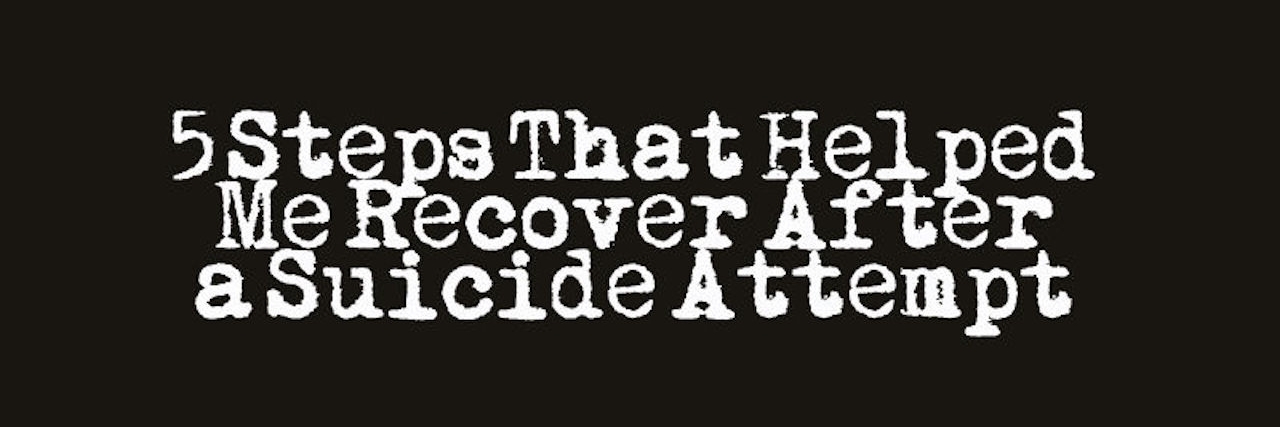Since I’ve begun sharing how I went from a being a pastor to being hospitalized in a psych ward, people often ask about my recovery. Everyone wants to know, is there a single solution? Where does the magic lie? How do they get their own lives (or their loved ones’) back? Or, as others have said, “What is the one thing that made you want to start living again?”
The truth is, there’s no magic formula, but here are some intentional steps that made my life better. I’m not a professional therapist, and everyone has a different recovery story. I can only share from my own experience.
Here are five steps that helped me recover after my suicide attempt:
1. Accepting treatment.
If I had cancer, you can bet I would take chemo. I might also listen to the naturopath’s advice to drink special juices and cut out refined sugars, or to follow the path of meditation to wholeness. But I would still take chemo.
Mental illness is a real thing. A disease. When the doctor says the chemicals in your brain aren’t firing correctly and a certain medication will help level you out, listen to the doctor.
It took a few tries to find the meds that were right for me, but it’s worth the hassle. Some made me too sleepy, some made me too grumpy, but eventually we settled on meds that helped me find my new normal.
Again, I’m no professional, but don’t rely on your primary care physician to help you sort out the complicated maze of mental health. You wouldn’t go to your family doctor for cancer treatment, so why would you do that for psychiatric needs?
Counseling was also an important part of my recovery. After my suicide attempt, spending time with a professional saved my marriage and, ultimately, my life.
2. Stop apologizing.
When my son was a toddler, he went through a very difficult time with his stomach. Frequently, he would vomit and make major messes. Each time, he would cry. “Dada,” he would say, “I’m sorry I frowed up.” My son couldn’t control having stomach trouble any more than I can control a panic attack in the middle of the work day. Both are inconvenient and problematic, but I wouldn’t choose anxiety or depression any more than someone would willingly choose to vomit.
I don’t owe anyone an apology for my mental illness. You don’t either.
3. Find a strong support system.
There are those who care about your soul, and there are those who only care to know what’s going on. It’s important to know the difference. Surround yourself with those who are willing to walk with you through the hard days. Be gracious with those who love you, but can’t help you.
4. Practice self-care.
Get good, solid, uninterrupted sleep. Don’t stay up all hours of the night to binge on your favorite show or read just one more chapter. I find when I’m tired, my symptoms are worse.
I’ve also learned to practice better eating. I’m a busy guy, and I’ve never been a big breakfast eater. See how I just made two excuses? No more excuses. Take your nutrition seriously. I’m not saying you have to join a gym, or post before and after pictures on social media. I’m just saying to eat as healthy as you can and as regularly as you can. It will help you feel better and get the most out of your day.
As a person with mental illness, there are so many triggers I can’t control — but I do have control over how I take care of myself.
5. Focus on the recovery, not the stigma.
The stigma of mental illness sucks. But worse is not getting better. And all any of us really want is to get better. Remember this: you are not your diagnosis. So, use your diagnosis to design a recovery plan and keep moving forward. Mental illness is not a death sentence.
Follow this journey on I Am Steve Austin. Click here to sign up for his free “Manifesto for Hard Days.”
If you or someone you know needs help, see our suicide prevention resources.
If you need support right now, call the Suicide Prevention Lifeline at 1-800-273-8255.
The Mighty is asking the following: Create a list-style story of your choice in regards to disability, disease or illness. It can be lighthearted and funny or more serious — whatever inspires you. Be sure to include at least one intro paragraph for your list. If you’d like to participate, please send a blog post to community@themighty.com. Please include a photo for the piece, a photo of yourself and 1-2 sentence bio. Check out our Submit a Story page for more about our submission guidelines.

